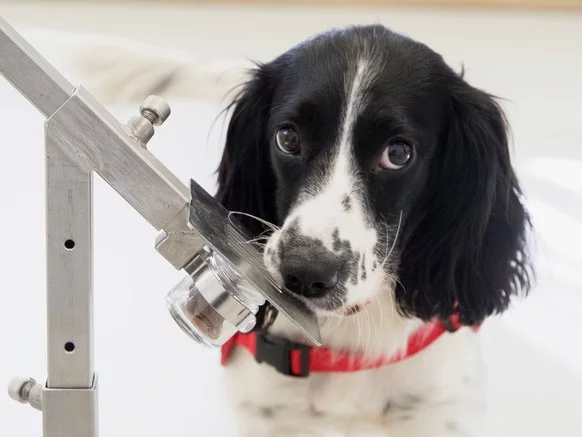These good boys are getting better and better. According to a new research, dogs could be trained to detect malaria infection in people by sniffing quite accurately.
The nylon socks wore by primary school children in the Gambia were used for testing of Malaria. The children wore the socks overnight. The dogs were trained for four months with the help of these socks.
Of the 175 pairs sent, 30 had been worn by children infected with the parasite. The results showed that dogs could pick out seven in 10 samples from infected children. They also picked one incorrectly.
The researchers still need to improve the dog’s accuracy and test them on people rather than socks, as well as investigate whether the animals can sniff out different species of malaria.
The super sensitive nose of dogs can sniff out cancer, Parkinson’s disease, migraines, low blood sugar and many more. They can detect the chemical changes in the human body through their sense of smell.
A person infected with the malaria parasite carries an aroma that makes the person more attractive to the mosquitoes that spread the disease.
“While our findings are at an early stage, in principle, we have shown that dogs could be trained to detect malaria-infected people by their odour with a credible degree of accuracy.” Professor Steve Lindsay from the department of biosciences at Durham University said. “This could provide a non-invasive way of screening for the disease at ports of entry in a similar way to how sniffer dogs are routinely used to detect fruit and vegetables or drugs at airports.
“This could help prevent the spread of malaria to countries that have been declared malaria-free and also ensure that people, many of whom might be unaware that they are infected with the malaria parasite, receive antimalarial drug treatment for the disease.”
Using dogs to detect parasite infection can save time as well as money. It takes at least 20 minutes to detect malaria and requires a highly trained professional. Dogs, on the other hand, are only required to be trained once. There is no technology exist, yet, that can match the odour detection ability of a dog’s nose.
“MDD have had positive results training dogs to detect diseases including cancer and diabetes sugar changes by odour. Said Dr. Claire Guest, CEO of Medical Detection Dogs. “This is the first time we have trained dogs to detect a parasite infection and we are delighted by these early results.”
Durham University did the research with the help of scientists from the Medical Research Council in the Gambia and it was funded by the Bill and Melinda Gates Foundation. The research also collaborated with the charity Medical Detection Dogs (MDD), the London School of Hygiene & Tropical Medicine (LSHTM) and the University of Dundee (all UK), the London School of Hygiene & Tropical Medicine (LSHTM), and the National Malaria Control Programme, The Gambia.
Malaria is a life-threatening disease and is capable of wiping out half of humanity. But dogs are here to save the day.

